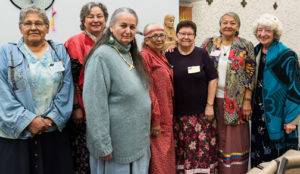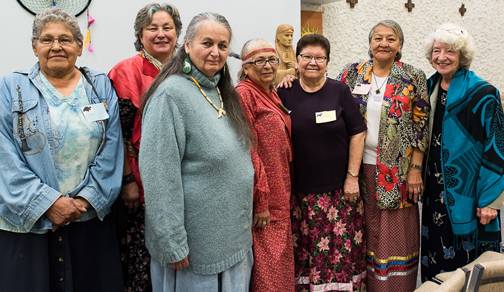Kateri Symposium Celebrates Indigenous Culture
WINNIPEG — A celebration of indigenous culture and faith was on display at St. Kateri Tekakwitha Aboriginal Catholic Church in Winnipeg recently, with a wide-ranging look at how native ways of life relate to the teachings of Pope Francis.

OMI Lacombe Canada’s Office of Justice, Peace and the Integrity of Creation (JPIC), in partnership with St. Paul University in Ottawa and St. Kateri Parish, created the symposium: “Bringing Into Dialogue Native Ways of Life and the Teachings of Pope Francis About Our Common Home: the Mother Earth/Creation.”
Organizers said their intent was to foster dialogue about the problems facing indigenous peoples in Canada and to bring forth awareness and collective responsibility of the issues presented.
Archbishop Richard Gagnon spoke on Pope Francis’ Encyclical letter Laudato Si, On Care for Our Common Home, and its timely references to human mistreatment of the earth.
The archbishop said Pope Francis quotes the Vatican II definition of the common good, and in the archbishop’s words, “the common good can only be properly achieved if there is peace, good order, security and stability and a concern for justice for all. Justice must be distributed, not kept for a few. Whenever these factors are violated, the result is unrest and violence. Therefore, the role of the state and politics is to practice distributive justice and to promote the common good. The role of religion is not political, per se, but to act as the elder voice to help purify our understanding and practice of justice.
“One needs only look around our world,” the archbishop said, “to see the countless examples of unrest, pain, violence and open war as examples of the failure of building the common good among mankind’s poverty, and poverty can take many forms. This is why the Second Vatican Council declared that the church must have a preferential option for the poor. This not only entails the proper destination of the world’s goods but a deep appreciation of the profound dignity of the poor. This is essential for the attainment of the common good. Pope Francis believes that his role as pope is to provide a clear pastoral example of what is necessary if we are to do this.”
The symposium did not avoid the centuries of struggles faced by indigenous people in Canada. Dr. Niigaan Sinclair, head of Native Studies at the University of Manitoba, said Canadians like to refer to themselves as a country of immigrants. “We forget that we are also a country of a partnership. The problem is one of misunderstanding, of relationships that are unbalanced and hierarchical. Every aspect of this country is based on violence in regard to indigenous people,” but, he added, there is no one individual or individuals to blame.
“In Anishinaabe love is defined as how someone opens us up. This is the biggest struggle, we love each other differently.” Sinclair said as native people continue fighting for their rights, the laws of the land are on their side. “Canada,” he said, “is on a massive losing streak of court trials.”
The pastor at St. Kateri, Rev. Nicanor Sarmiento, himself an indigenous person of an Andean tribe in Chile, and author of Andean Christian Theologies, Elements of a Rainbow of Theological Voices, said that by the mere fact that all people stand on the ground “we are all attached to the cosmos, you cannot separate from it. Everything and everyone in this world is interconnected.”
Sarmiento spoke of the Dene of the boreal and Arctic regions of Canada who believe “everything has a spirit; everything has the breath of God within it.”
He said the parishioners of St. Kateri have incorporated important indigenous symbols and rituals into the life of the church, such as drumming and smudging.
Later in the morning a group of women conducted a sacred water ceremony performed for special events and feast days. The water ceremony is entrusted to women for the replenishing of blessings upon them from the sacred waters.
Follow this link to go to the Prairie Messenger Website:
Kateri Symposium Celebrates Indigenous Culture – Prairie Messenger
By James Buchok – Prairie Messenger


